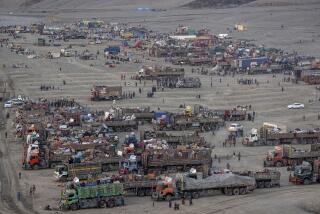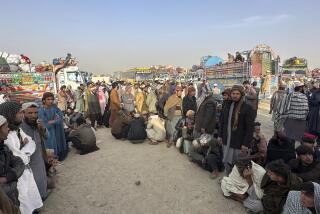Pakistan struggles to seal its border
(RealVideo and QuickTime)
- Share via
TORKHAM CROSSING, Pakistan — As the Taliban unravels and its soldiers retreat, a worried Pakistan was struggling Wednesday with an impossible task: sealing off its 1,500-mile border with Afghanistan, a porous line that slices through ancient tribal territories and desolate mountain ranges.
As the opposition Northern Alliance forces pushed south from Kabul, the Afghan capital, Pakistan did its best to block its borders with layers of gates, checkpoints and guards. But Taliban soldiers straggled quietly across the line nonetheless -- and officials fear more will follow.
“They’ve got a border they can’t control,” a Western diplomat said. “There are some parts where no official representative of the Pakistani government has ever gone.”
Shared blood, treacherous terrain and a common zeal for fundamentalist Islam knit together residents in the tribal borderlands -- and create a natural escape hatch for fleeing Taliban. The Islamic schools and refugee camps on the Pakistan side of the frontier long have been considered cradles of the Afghan regime.
Just a few weeks back, Pakistani sympathizers scrambled north over these wrinkled mountains, determined to battle the Northern Alliance alongside their Afghan brothers. Now, with the Taliban army falling apart, many of its soldiers are likely to cross the line -- and bring their friends.
“They can hide themselves here,” said Rasul Amin, director of the Afghan Study Center in Peshawar, Pakistan. “Their parties are here, their people are here. When they come they will be protected.”
The U.S. Congress earlier this month agreed to give Pakistan $73 million in emergency aid for the purchase of helicopters, night vision goggles and training for its border security. The assistance is something of a security investment -- the loose boundary between the two countries is a famous corridor for guns, drugs and fundamentalist warriors.
But stemming the flow is no quick task -- if it’s possible at all. This wilderness is a relentless wash of mountains and rocky plains, cut by a few rough roads. “We are concerned about the whole border,” said a Pakistani Foreign Ministry official. “There are about 100 points or more where anyone can slip in.”
There already are reports of Taliban officials and soldiers crossing. The movement’s rulers in Nangahar province, just across the border from here, reportedly sneaked over earlier this week and hid in a nearby Pakistani “madrasa,” or religious school. Taliban soldiers were spotted wandering in Peshawar and in the Pakistani city of Quetta.
A young Taliban official making his way home through Quetta said he left at the bidding of Taliban leader Mullah Mohammed Omar, whose instructions were repeated among the rank and file: “Save your life, go to your homes, but keep your arms underground. At the moment we have no need of Taliban because they are bombing us, but after some time if we need help from you, we will find you through your party.”
“We wanted to fight,” said Nasim, the official, who left a religious school in Quetta to join the Taliban. “But they told us, “You have no experience in fighting,’ and they sent us to work in an office.”
Despite heavy international criticism, Pakistan still recognizes the Taliban government. On Wednesday, the Taliban embassy in Islamabad, the capital, was open. Pakistani Foreign Ministry spokesman Aziz Ahmed Khan said the border will remain passable for travelers with “valid travel documents.” In other words, those with visas issued by the Taliban, a regime already ousted from its own capital.
But amid the looming mountains around the storied Khyber Pass, the border crackdown was obvious Wednesday. The metal gate here that separates Afghanistan from Pakistan was bolted shut.
Hundreds of frustrated Afghans living in Pakistan mobbed the checkpoint. Some were headed home because they heard Kabul had fallen and assumed it was safe; others were frantic to find their families. None was allowed into Afghanistan.
“All day we hear contradictory reports about the war, and I don’t know where my family is,” said Noor Mohammed, a Jalalabad native who clutched a strand of prayer beads. “I just want to go to my country.”
More to Read
Sign up for Essential California
The most important California stories and recommendations in your inbox every morning.
You may occasionally receive promotional content from the Los Angeles Times.













